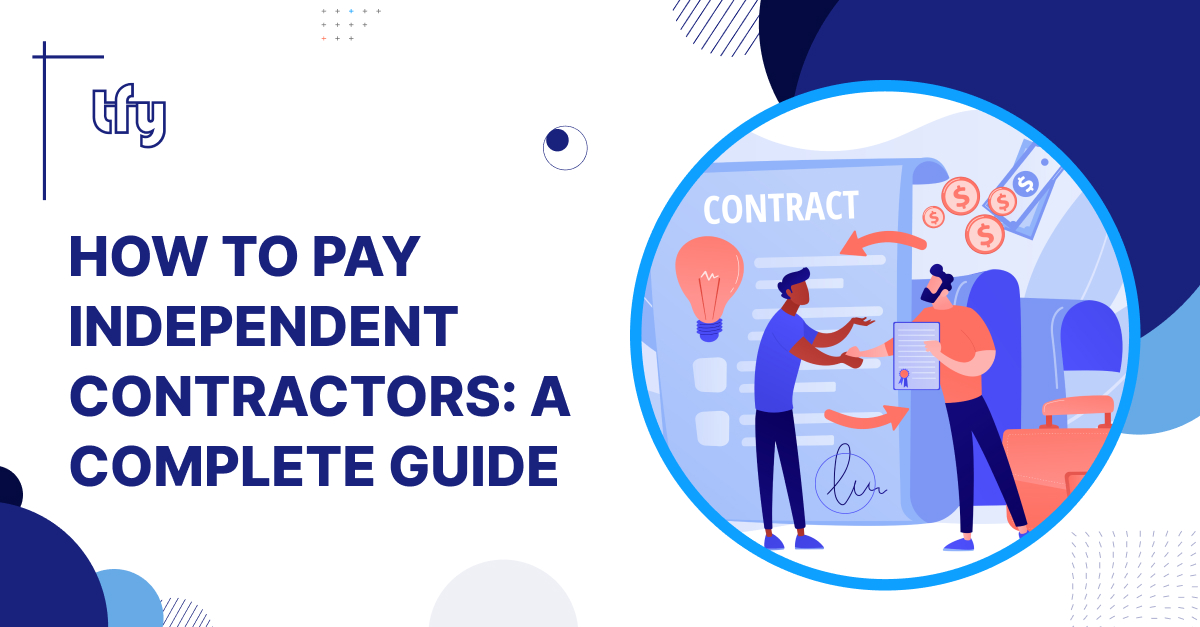
Independent contractors have become a cornerstone of today’s workforce. From freelance designers and international developers to marketing consultants and field specialists, contractors allow businesses to scale skills quickly without long-term commitments.
But finding great talent is only half the equation — how you pay contractors determines whether they’ll want to keep working with you.
Late payments, rigid options, or lack of transparency can push top talent away. On the other hand, fast, reliable, and flexible payments build loyalty, improve retention, and strengthen your employer reputation.
In this guide, you’ll learn:
- The most popular ways to pay independent contractors (and their pros and cons)
- Best practices to ensure timely, transparent payments
- Global compliance and tax considerations
- How automation tools like TFY simplify contractor payments worldwide
Why Timely Payments Matter for Independent Contractors
Contractors choose independence for flexibility — often juggling multiple clients, deliverables, and payment schedules. Like any business, they have operating expenses, taxes, and cash flow needs.
Delayed payments create friction:
- Contractors deprioritize your projects when payments are late.
- Your employer reputation suffers within the freelance community.
- Financial uncertainty can directly affect work quality and engagement.
💡 Bottom line: Paying contractors promptly isn’t just polite — it’s a business advantage that improves performance, retention, and brand credibility.
The Most Common Ways to Pay Independent Contractors
The right payment method depends on where your contractors are based and how they prefer to be paid. Offering multiple options makes you more attractive to global talent.
1. Direct Deposit (ACH)
Why contractors love it
Fast, secure, and direct payments to their bank account.
No check delays or mailing issues.
Low processing costs compared to paper checks.
Drawbacks
Requires a local bank account.
Hard to reverse once initiated.
Sensitive bank data must be protected.
💡 Best for: Ongoing relationships with domestic contractors.
2. Pay Cards
Overview
Pay cards function like reloadable debit cards. You can load contractor earnings directly onto the card — a useful option for contractors without bank access.
Benefits
No bank account needed.
FDIC-insured funds.
Instant access to earnings after payment.
Challenges
Lost or stolen cards can delay fund access.
Some ATM or conversion fees may apply.
💡 Best for: Contractors in regions with limited banking access or unbanked populations.
3. Electronic Payment Platforms (PayPal, Wise, Payoneer, etc.)
Overview
These platforms simplify domestic and international payments through digital wallets or linked bank accounts.
Pros
Fast cross-border transfers.
Easy setup and user-friendly interfaces.
Integrates easily with invoicing tools and marketplaces.
Cons
Transaction and withdrawal fees can add up.
Exchange rates may vary and reduce payout value.
💡 Best for: International contractors who prefer flexible, digital payment options.
4. Paper Checks
Overview
Although old-fashioned, paper checks are still used in certain industries or as a backup when digital transfers fail.
Pros
No bank account required.
Tangible proof of payment.
Cons
Slow delivery, risk of loss or delay.
Higher administrative costs.
Perceived as outdated or less professional.
💡 Best for: Traditional sectors or backup use when electronic options aren’t viable.
Setting Payment Terms That Work for Everyone
Transparent payment terms help prevent confusion and foster trust. Define these elements before work begins:
Rate structure: Hourly, project-based, or milestone-based.
Due dates: Net 15, Net 30, or payment upon receipt.
Partial payments: 50/50 structures can protect both sides.
Currency: Especially critical for cross-border agreements.
📌 Pro Tip: Always use a written contract or digital agreement outlining payment terms, milestones, and responsibilities.
Global Compliance: Paying International Contractors the Right Way
Paying contractors abroad introduces added complexity — tax obligations, currency conversions, and differing employment laws.
Key considerations include:
Worker classification: Ensure contractors are not misclassified as employees (to avoid legal penalties).
Local regulations: Some countries enforce strict payment timelines and reporting requirements.
Tax documentation:
U.S. contractors: Issue Form 1099-NEC annually.
Global contractors: Tax forms vary by country and bilateral agreements.
💡 Pro Tip: Using a global compliance platform like TFY ensures adherence to local tax, labor, and currency laws. TFY’s system handles compliant payments in 184+ countries, offering both speed and transparency.
Why Automating Contractor Payments Makes Sense
Manual payment processes — spreadsheets, manual approvals, and wire transfers — can quickly turn chaotic. They increase risks of:
Lost or duplicated invoices
Payment delays
Misclassification or compliance breaches
An Independent Contractor Management System (ICMS) like TFY automates end-to-end payments and compliance:
✅ Key Advantages
- Automated invoice approval and payout scheduling
- Multiple payment methods (ACH, PayPal, Payoneer, Pay cards, crypto)
- Compliance-ready reporting for local and international tax authorities
- Real-time dashboards for spend, payment status, and contractor activity
Result: Faster payments, higher contractor satisfaction, and reduced administrative load for HR and Finance teams.
Best Practices for Paying Contractors in 2025
1. Offer flexibility: Provide multiple payment methods to match contractor preferences.
2. Stay compliant: Classify workers correctly and file necessary tax documents.
3. Automate approvals: Use workflow automation to prevent bottlenecks.
4. Keep audit trails: Record all payment details for transparency and accountability.
5. Communicate proactively: Send payment reminders and confirmations automatically.
💡 Tip: Modern solutions like TFY also allow for AI-driven anomaly detection — flagging duplicate invoices or suspicious activity before it becomes a compliance risk.
Final Thoughts
Paying independent contractors on time and with transparency builds long-term partnerships. By combining multiple payment options, clear terms, strong compliance, and automation, businesses can manage contractors efficiently across borders.
TFY’s global contractor payment platform simplifies everything — from onboarding to payout — in a single, compliant system.
With support in over 184 countries, automated tax handling, and flexible payment options (including crypto), TFY gives global organizations the control and confidence they need to pay contractors fast, fairly, and compliantly.
Book a Demo with TFY to see how you can simplify global contractor payments in 2025.



